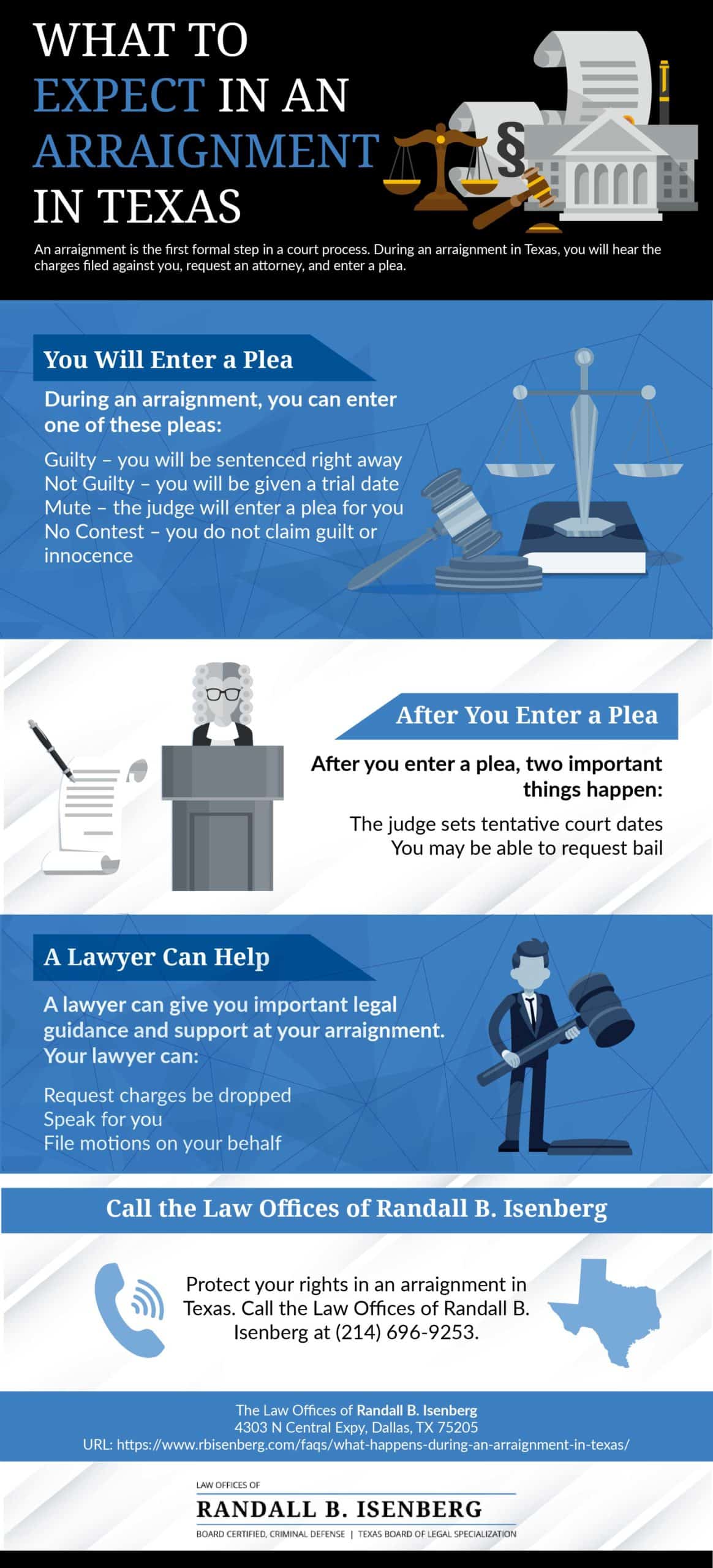
The Sixth Amendment of the U.S. Constitution grants every person the right to hear the charges filed against them. You get this opportunity during an arraignment.
Considered the first formal step of the criminal court process, an arraignment is a pre-trial court hearing in which you are formally charged. Individuals charged with felonies, such as murder and aggravated assault, or misdemeanors, such as first offense DWI or crimes involving marijuana, in the state gets arraignments scheduled.
What happens during an arraignment in Texas is that the judge will ask you if you want to be appointed a lawyer after the charges are read. If you qualify for court-appointed counsel, the judge will appoint your representation. Then, you get the opportunity to enter a plea against the charges filed against you.
An arraignment often gets held within 72 hours of an arrest. When the court allows defendants to post bond, sometimes, arraignments are held a few weeks after an arrest.

Types of Pleas Permitted During an Arraignment
During an arraignment, you need to choose to enter one of the four following pleas.
Guilty Plea
When you enter a guilty plea, you are admitting to the accused crimes. A judge will only accept this plea if it is valid, meaning he/she wants to ensure that someone is not coercing you into admitting guilt. The judge also will make sure you under your rights and the ones you give up when you enter a guilty plea. Most importantly, once a judge determines a plea is valid, you are sentenced immediately.
Not Guilty Plea
When you plea of not guilty, you are stating in open court that you did not commit the crimes filed against you. After your plea, the judge sets a trial date. A Dallas County DWI lawyer can gather evidence on your behalf to support your plea and represent you in court.
Some worry that entering a not guilty plea will make a defendant look like a liar if they later plead guilty or accept a plea bargain. It is not considered lying to the court. Entering this plea gives you an opportunity to prepare for a fair trial.
Mute Plea
Entering a mute plea is when a defendant stays silent and does not make a plea. The lawyer representing the defendant informs the court of the mute plea, and then, the judge enters the plea as not guilty. Entering this type of plea, allows you to plead not guilty without admitting that the criminal justice process moved along correctly until then.
No Contest Plea
When entering a no contest plea, you are not disputing the charges, but you also are not admitting to committing the crimes against you. In some cases, a no contest plea is reserved for cases where a related civil trial may follow.
After a Plea Is Entered
After you enter a plea, a judge likely will set tentative dates for related conferences and proceedings. If appropriate, you also may request bail. Bail secures the release of a person until his/her next trial date. Often, a defendant must post a certain amount of money in exchange for their release. A person loses those funds if he/she fails to show up for court.
Reasons to Retain Counsel Before Arraignments
Arraignments may be just the beginning of the criminal court process, but that does not mean having a lawyer by your side right away cannot help. Having representation with you at your arraignment presents the opportunity for counsel to provide legal guidance and support during a stressful time.
Additionally, if you have already retained counsel, your lawyer also can ask the court to drop the charges. It is up to the presiding judge as to whether he/she will accept or deny any motions at that time.
When looking to retain legal counsel, focus your search on lawyers specialized in your particular charges. For example, if you have been accused of family violence, contact a Dallas domestic violence attorney for guidance.
When you have a lawyer present, he/she can handle all the talking for you. Therefore, you decrease your chances of offering incriminating information.
Get a Free Legal Consultation in Texas
If you or someone you love faces arrest for a criminal offense in Texas, then contact us at the Law Offices of Randall B. Isenberg. We will discuss your options, build a strong defense strategy, and fight to protect your rights.
Our bilingual staff is available 24 hours per day, seven days a week. Call us today at (214) 696-9253 to get a free case consultation.










